
Related
Topics
Guests
- Eamonn McCannjournalist, writer, and activist based in Derry, Northern Ireland, and former member of the Northern Ireland Assembly.
We speak with journalist and activist Eamonn McCann about Queen Elizabeth II’s legacy in Ireland and the impact of her recent death on the prospects of Irish unification. This comes as King Charles III visited Northern Ireland Tuesday on his national tour commemorating his mother, whose reign oversaw more than 3,600 deaths over three decades in Northern Ireland in fighting between the Irish Republican Army and forces backed by Britain. “There is a great confidence among nationalist and republican leaders in Northern Ireland that we are now moving inexorably towards a united Ireland,” says McCann, a former member of the Northern Ireland Assembly.
Transcript
AMY GOODMAN: As thousands of people line the streets of London to watch the procession carrying the casket of Queen Elizabeth II from Buckingham Palace to Westminster Hall, where her body will lie in state until her state funeral Monday, we begin today’s show looking at the monarch’s legacy in Ireland. King Charles III was just in Northern Ireland Tuesday as part of his tour of sorrow after the death of his mother. He spoke in Hillsborough, Northern Ireland.
KING CHARLES III: My mother felt deeply, I know, the significance of the role she herself played in bringing together those whom history had separated, and in extending a hand to make possible the healing of long-held hurts. At the very beginning of her life of service, the queen made a pledge to dedicate herself to her country and her people and to maintain the principles of constitutional government. This promise she kept with steadfast faith. Now, with that shining example before me, and with God’s help, I take up my new duties resolved to seek the welfare of all the inhabitants of Northern Ireland.
AMY GOODMAN: During the queen’s reign, more than 3,600 people died over three decades in Northern Ireland in fighting between the Irish Republican Army and forces backed by Britain. In 1979, an IRA bombing killed Lord Louis Mountbatten, the queen’s second cousin. In 2012, the queen famously shook hands with former IRA leader and Sinn Féin politician Martin McGuinness in Belfast. Last week Sinn Féin leader Michelle O’Neill paid tribute to the queen.
MICHELLE O’NEILL: There’s no doubt that she leaves a legacy of someone who reached out the hand of friendship, someone who advanced peace and reconciliation, someone who sought to build relations between those of an Irish and those of a British identity. And I think that was sterling work and something that I think she’ll be very much remembered for here on this island.
AMY GOODMAN: This comes as King Charles III visited Belfast Tuesday and met with members of Sinn Féin, which is now the largest party in Ireland after elections in May, where response to the queen’s death has been mixed.
For more, we’re joined by Eamonn McCann, journalist, writer, activist, in Derry, Northern Ireland. Eamonn is a former member of the Northern Ireland Assembly. He also took part in the march on Bloody Sunday in 1972 and helped form the Bloody Sunday Trust. His 1974 book, War and an Irish Town, was recently republished.
Eamonn McCann, welcome back to Democracy Now! For people who aren’t familiar with the struggle, if you can lay out the history of the monarchy and Northern Ireland?
EAMONN McCANN: Well, the history of the monarchy and Northern Ireland is a somewhat ambivalent one. I mean, of course, the vast majority of unionist people are overwhelmingly Protestant. The Protestant unionist community has traditionally worshiped the royal family, that’s been a symbol of their desire to be part of the United Kingdom rather than move into a united Ireland. So the queen has been a figurehead for them, sort of an icon, if you like, of Britishness. So, their fervor for the queen, fervor of Northern Ireland Protestant unionists, has, if anything, been much more intense sort of than the fervor of the majority of the British citizens across the water.
And after the formation — after partition in Ireland in 1922, almost exactly 100 years ago, the royal family rehinted, or shared outright on some occasions, that they didn’t reciprocate the loyalty which Protestant unionists in Northern Ireland showed towards them. When the Northern Ireland Parliament, at the Stormont in Belfast — when the Stormont Parliament was opened in 1922, it was opened by George V. The monarch came across and spoke. And during that speech, he expressed a hope that there would be reconciliation between all factions in Ireland and that the disputes over sovereignty and the antagonism between Catholics and Protestants in the North — he expressed a hope, way back in 1922, that this could be erased.
And then, there’s many perspectives in which you can see the events of the last couple of days, but it is, I think, politically meaningful to look at it and say, “Well, there is that royal family project brought to fruition by — not by Queen Elizabeth, but by the death of Queen Elizabeth,” when, once again, the royal family is associating itself, to some extent — I wouldn’t exaggerate this, but is certainly associating itself with advocates for a united Ireland. And this is bound to cause, over the coming weeks and months, considerable confusion and dismay among the unionist population of the North and a certain, if there’s such a thing, ambivalent euphoria among Catholic nationalists, who will see, in effect, what they see as the endorsement of the campaign for a united Ireland by the British royal family as a major step towards a united Ireland and a way, sort of, of leaving the unionist population sort of in the past, in history.
Now, that’s a very initial judgment. Obviously, these gestures by Prince Charles — or, King Charles, sorry, I mean, have only come sort of in the last week, since the death of his mother, and we have to see how they play out. But certainly, I would say that at this point, sort of in less than a week after the death of the queen, Irish nationalists are much more content with what has been happening than the traditionally loyal royalists, that is, of the unionist population. So, that’s a turnout for the books, if you like. Certainly, it’s a significant turning point sort of in attitudes in Northern Ireland and in both communities in Northern Ireland towards the monarchy. This could turn out to be very significant, or it could turn out to be a brief moment, sort of, which passes when it’s undermined by events over the — in the next near future.
JUAN GONZÁLEZ: And, Eamonn McCann, following —
EAMONN McCANN: [inaudible] — yeah, yeah.
JUAN GONZÁLEZ: Eamonn McCann, following that up, the change in perspective and attitude of Sinn Féin toward the monarchy? I mean, clearly, from the bombing that killed Lord Mountbatten in 1979 to the handshake of Martin McGuinness in 2012 with the queen, and now with Michelle O’Neill, the current Sinn Féin leader, paying tribute to the queen, does this view of how the monarchy may be taking a position quite distinct from the elected leaders of the United Kingdom, part of the reason why Sinn Féin has taken such a much more open view toward the monarchy?
EAMONN McCANN: Yes, I think that’s true. And I think it’s — let me set the context for that. It’s important to understand that the majority people in Britain sort of have never actually felt a sense of kith and kin with the Northern unionists here. I worked for seven years in London. And in all that time, I worked as a laborer, so I was not leaving in elite circles. But I don’t think I ever met a single person who thought that a Northern Ireland was part of their country. They have no sense of kith and kin with the unionists of Northern Ireland. I recall one of my workmates sort of turning to me and saying, “Look, just explain to me: Which part of Ireland do we own?” And for a London laborer to ask you that tells you a great deal about the perception of English people towards the Protestant people of Northern Ireland. The loyalty of loyalists in Northern Ireland has never been reciprocated by the British people. And indeed, there is good evidence to believe, in the historical records, you know, that British politicians never really were concerned about bringing Northern Ireland with them.
So, you know, the unionists who believe in themselves being part of the United Kingdom and who have ferocious loyalty to the British monarchy, they must be in a state of confusion, sort of. And “fear” would be putting it too strongly, but certainly they are anxious about their future as British unionists in the future as we move to constitutional talks.
JUAN GONZÁLEZ: And I wanted to ask you about — James Connolly was an Irish republican socialist and trade union leader. Over a hundred years ago, back in 1911, he wrote a piece titled “The British Monarchy Is an Affront to Democracy.” What is your view in terms of the monarchy itself and the possibilities being raised now for the first time to consider ending the monarchy?
EAMONN McCANN: Well, I think that the argument about the monarchy and the viability and acceptability of the monarchy is beginning to be discussed right across Britain. And, of course, it’s very early days yet, but, of course, Queen Elizabeth for 70 years, I mean, was the only queen, the only head of the monarchy, that anybody in these islands had ever known. So her position wasn’t really an occasion for controversy. It became like the wallpaper. It was just there, and events happened in front of it.
But it’s very doubtful, very doubtful indeed, whether King Charles, as you know, yes, King Charles III, will ever sort of attain that sort of more or less automatic loyalty of the population of Britain. Forget about Northern Ireland and the island of Ireland. In Britain, I think it’s going to be more easy — more easy for anti-monarchists to make their case, because they won’t be dealing sort of with that uncritical reverence which was directed towards Queen Elizabeth.
And we’ve also got, at the moment, a sort of little hint of what might happen, even today. I mean, we’ve learned sort of that at the laying in state, or whatever the phrase is, of the queen’s body at Westminster Hall, we’re going to see Prince Harry — of course, who made the big mistake, as far as the royals are concerned, of marrying sort of an American divorcée of color, and she’s been frozen out, sort of, in general terms. But Prince Harry is not going to be wearing his military uniform as he stands at his grandmother’s casket, whereas Prince Andrew, a good friend of Jeffrey Epstein, and a man who in the eyes of the British people, as with most people around the world, is entirely discredited, you know, he’s going to be there, playing a prominent role. And it’s already been announced that he will fill in for King Charles III on some ceremonial occasions in the future. So he hasn’t gone away, you know, Prince Andrew. And it will be interesting to see what the attitude of people is to the growing debate about the royal family when they factor in the presence and gaudy array, sort of, of Prince Andrew. He’s a big embarrassment to the royal family, although he hasn’t been frozen out in the way that Meghan Markle has and in the way that Prince Harry is beginning to be frozen out sort of by the British establishment. So, interesting times to come. We’ll have to see how all that works out.
AMY GOODMAN: Just to be clear, Meghan Markle, who leveled charges of racism against the royal family, and —
EAMONN McCANN: Yes.
AMY GOODMAN: — Prince Andrew, who paid out a multimillion-dollar settlement in a sexual assault case involving himself —
EAMONN McCANN: Yes, 12, 12 —
AMY GOODMAN: — related to Jeffrey Epstein.
EAMONN McCANN: Yes, and it should be remembered that, you know, Prince Andrew, like the rest of the royals, doesn’t really have money of his own. That was paid by the royal estate, by his mother. And the total sum that — given to Andrew to pay off his accusers and get him off the hook for being an associate and a co-participant with Jeffrey Epstein in various sort of sordid and discreditable episodes — 12 million pounds of British taxpayers’ money was paid to get Prince Andrew off the hook for all that.
Now, we’ll see, when Prince Andrew appears sort of in his royal regalia and his military uniform, dripping with medals and regimental colors — when he appears at Westminster Abbey with that, I think it will tinge sort of the majesty of the event, the majesty of the royal funeral. Already we’ve heard sort of people shouting sort of from crowds, in Britain, at Prince Andrew as the royal procession has — sort of pays from one place to another sort of over the last few days, and people shouting “nonce” at him, and “Get out of it!” So, that’s going to be interesting. But, of course, the queen stood by Andrew — she never publicly endorsed what he had done, but stood by him and had him to Buckingham Palace and all that. But it’s a bit early to write the history, sort of, of how that will affect the standing of the monarchy generally in Britain. But it’s going to be one to watch.
AMY GOODMAN: And speaking of money, the future king, Prince William, if there is one, has just inherited a billion-dollar estate, the Duchy of Cornwall. The duchy owns a sprawling portfolio of land and property covering 140,000 acres, most of it in southwest England. But I wanted to ask you, Eamonn, about 1972, about Bloody Sunday, for people to understand the relationship between Britain and Northern Ireland. You were there.
EAMONN McCANN: I was there. And, I mean, briefly, at the end —
AMY GOODMAN: Explain what happened.
EAMONN McCANN: Well, there was a civil rights march in Derry, January the 30th, 1972, in which about 10,000 people marched. They were marching against the military presence in Northern Ireland, and specifically for the rights of people. It was a civil rights march. It wasn’t a republican march. It had a broad support.
And at the end of that march, it came into the area of the Bogside, where I am now, which is a Catholic working-class nationalist area, overwhelmingly. And as the march came in and prepared for a meeting, Bernadette Devlin, whose name might ring a bell with some people who are watching, she was about to speak to the people, when we heard the crack crack of rifles coming from about 150 yards away at the bottom of Russell Street. And I remember well that happening and myself and thousands of others taking a few seconds, I mean, to realize that what was happening was that British soldiers were shooting at us. The Parachute Regiment of members of the 2nd — sorry, 1st Battalion of the Parachute Regiment had come in behind the march as they came into the Bogside, and people stopped and assembled to hear a public meeting to be addressed by Bernadette Devlin and others. And, of course, 13 people were killed. Another 13 were wounded.
That was carried out — that massacre was carried out, as I say, by members of the Parachute Regiment, of which, as he then was the Prince of Wales, i.e. King Charles III — he was the commander-in-chief of that regiment. So, when republicans now move to make peace, and they met with King Charles yesterday on very friendly terms and so forth, that’s in sort of savage contradiction to the role, sort of, of the monarchy, or the troops operating under the monarch’s name, the role that they had played back then. So, there has been a seismic and very dramatic change sort of in the way republicans, for example, in the Sinn Féin party are willing to see the British monarchy and relations with Britain generally.
Just 10 years ago — stop me if I’m going on too long, sort of, in these answers, Amy. It’s just 10 [ sic] years ago that the queen mother died, i.e. the mother of Queen Elizabeth II. When she died, the leader of the moderate nationalist party, Sinn Féin’s moderate rivals, the Social Democratic and Labour Party, they expressed condolences. And the denunciation of them by Sinn Féin was ferocious to listen to it, and made many members of the SDLP to wilt. Its name, the Social Democratic and Labour Party, SDLP, was on placards and sort of in slogans on gable walls. Sinn Féin turned it into SDLP, the “Stoop Down Low Party” — for doing what Sinn Féin has done over this last few days.
So, you know, that’s for complicated and subtle reasons, you know, if you want me to go into. It’s sort of historical reasons. I’ll just put this in. At no time in the history, indeed, of Northern Ireland, and not just of the Troubles, at no time has the majority of the Catholic nationalist people in Northern Ireland ever supported republican armed struggle. I know the armed struggle, because it is dramatic, and people are killed, and there’s lots of coverage and all the rest of it, you know, is sort of much more newsworthy than the dull, plodding business of ordinary, bourgeois politics. The armed struggle was very dramatic, and a lot of people stood by members of the IRA, Sinn Féin’s military wing at that time. A lot of people stood by them because they were nationalists. Many people supported the armed struggle through gritted teeth. But certainly there never was solid majority support among the Catholic nationalists of Northern Ireland for a strategy of violence to bring about a united Ireland or anything else.
So, in a way, when we talk about the adaptations that Sinn Féin has made, the contribution to the peace process, and the adaptations that they have made in that context, I mean, to that issue, to the British royal family, you see, keep in mind that this isn’t such a — in terms of abandoning the armed struggle and so forth, to an objective observer, this is something which has been sort of in the making, beginning to happen, sort of, over a long number of years. This has been the culmination of it. This has been the ceremonial confirmation of that relationship between the leadership of Sinn Féin and the British establishment generally.
JUAN GONZÁLEZ: And, Eamonn, in terms of the evolution of the movement to free Northern Ireland, to reunite with Ireland, what do you see are the prospects now, especially now with the changes in the monarchy, with the Brexit — with the Brexit vote, that has made more difficulties with the United Kingdom and Northern Ireland being within the United Kingdom — what are the prospects that you see for the North reuniting with the Irish Republic?
EAMONN McCANN: Well, the honest answer is that I don’t know. And what’s more, neither does anybody else. I mean, there is a great confidence among nationalist and republic leaders in Northern Ireland that we are now moving inexorably towards a united Ireland and redrawing of all the constitutional boundaries sort of on the island of Ireland. If you’re asking me personally, I dissent from that. I don’t believe that it’s going to be that smooth at all. I don’t think, if you look.
You know, Irish people tend to look on history, sort of look on their own situation, sort of in terms of a very long history, going back hundreds of years. I heard a nationalist politician talking a few months ago, when somebody said about the Troubles starting, and he responded from the platform, “The Troubles started when Cromwell landed.” You know, a lot of people see it like that, you know? And whether a united Ireland comes about will depend an awful lot on relations between Catholics and Protestants, nationalists and unionists here in Northern Ireland, to the extent at which they are ameliorated.
One thing we can say, that the idea of using armed struggle, using violence, or to coerce the Protestant in the North into a united Ireland, that’s gone. That’s not going to happen anymore. The people who were advocating that and carrying that out have realized that it was never possible, and have abandoned it for constitutional politics. And what’s happened in the last couple of days is confirmation of the strategy, a formalization, sort of, of that attitude. And we’ll have to see what happens.
There’s a number of things to keep in mind, but one of them is, that I just mentioned, this one, as I may have said at the beginning, that people in England, Scotland and Wales, including the political leaders of Britain, including the Conservative Party, whether very right-wing and patriotic and the rest of it, they do not regard any part or any section of the Northern Irish people as an integral element, sort of, in British citizenship. And that’s going to be very difficult as that becomes — it has already, over the last couple of days, become more clear, been spelt out for people, how the unionist population, a unionist state — there are sort of intransigent unionists, as there are intransigent everything. Whether they are going to weaken or soften their attitudes remains to be seen. I doubt it. I doubt it. But let’s wait and see.
AMY GOODMAN: Eamonn McCann, we want to thank you so much for being with us, journalist, activist in Derry, Northern Ireland. Eamonn is a former member of the Northern Ireland Assembly, also took part in the march on Bloody Sunday in 1972, helped form the Bloody Sunday Trust, author of the recently republished book, War and an Irish Town.
Next up, The Storm Is Here: An American Crucible. We’ll speak with The New Yorker's award-winning war correspondent Luke Mogelson. He's been in Afghanistan, in Syria and Iraq, but he’s talking about the war at home as he writes about right-wing extremism and the 2020 election.

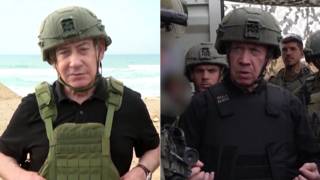
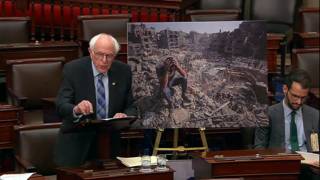
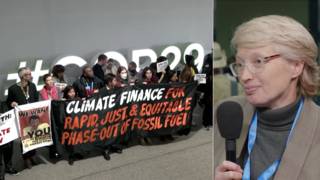
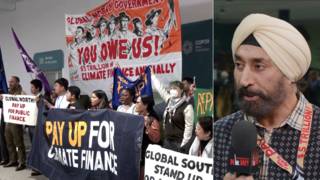





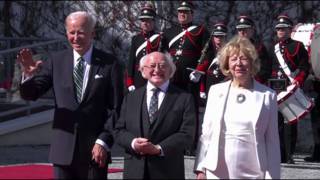
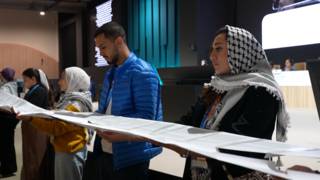
Media Options